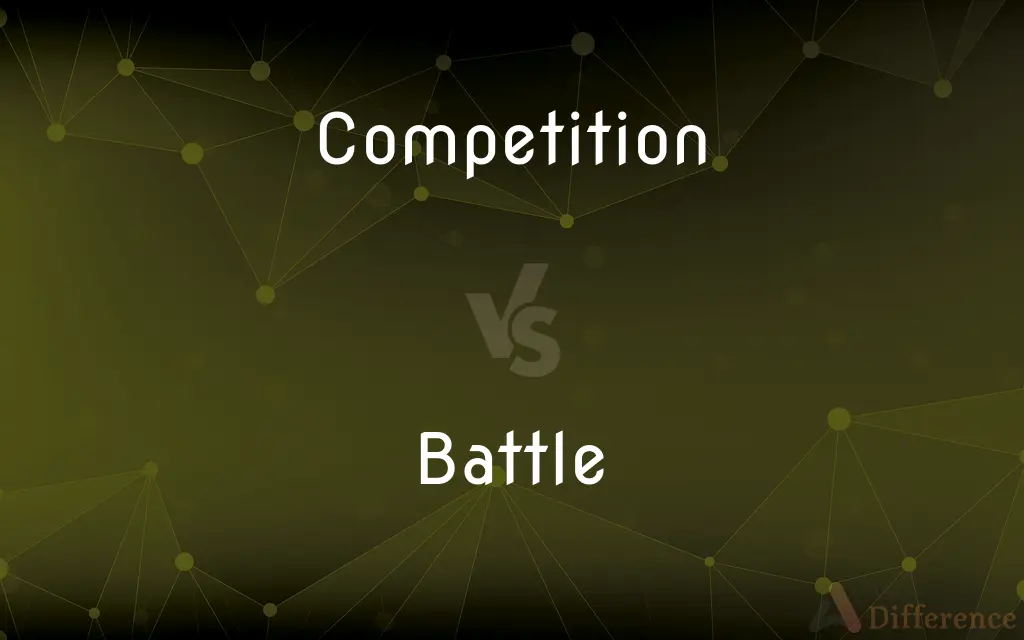Competition vs. Battle — What's the Difference?
Edited by Tayyaba Rehman — By Maham Liaqat — Updated on March 29, 2024
Competition involves contestants vying for superiority or a prize within a set of rules, while a battle is a conflict or struggle, often violent, between opposing forces.

Difference Between Competition and Battle
Table of Contents
ADVERTISEMENT
Key Differences
Competition is a broad term that encompasses any scenario where individuals or groups compete against each other to achieve a goal or win a prize. This can range from sports and academic contests to business and personal achievements. Competitions are usually governed by a set of rules and are often designed to measure skill, ability, or talent. On the other hand, a battle refers specifically to a fight or conflict, typically involving armed forces. Battles are characterized by their strategic, physical, or ideological confrontations and are a more direct form of conflict.
While competitions can be friendly and aim to promote excellence and improvement among participants, battles often signify hostility and are aimed at defeating or subjugating an opponent. Competitions encourage participants to outperform others within a structured and often regulated environment, whereas battles involve overcoming an adversary often through force or strategy.
Competitions are usually structured with clear objectives, criteria for winning, and rewards for participants. They are often part of larger events or leagues, emphasizing personal or team growth. Conversely, battles are incidents in wider conflicts, such as wars, and success is measured by gaining advantage or territory over the opponent, often with significant consequences.
The nature of participation differs significantly; individuals choose to enter competitions, driven by motivation for recognition, reward, or personal achievement. In contrast, participants in battles are often compelled by duty, necessity, or survival, highlighting the involuntary aspect of conflict.
The outcomes of competitions and battles also differ in their implications. Winning a competition might result in accolades, prizes, and enhanced reputation, contributing positively to one's status or career. However, the outcome of a battle, while potentially leading to strategic advantages, often results in loss and devastation, impacting lives and territories profoundly.
ADVERTISEMENT
Comparison Chart
Nature
Structured contest with rules
Conflict or struggle, often violent
Objective
Achieve superiority or win a prize
Overcome or defeat an opponent
Environment
Regulated and often friendly
Hostile and compelled
Participation
Voluntary, motivated by reward or recognition
Often involuntary, driven by duty or need
Outcome Implications
Positive, e.g., awards, personal growth
Negative, e.g., loss, devastation
Compare with Definitions
Competition
An event where skills or abilities are judged.
The dance competition showcased remarkable talent.
Battle
A military engagement between opposing forces.
The battle was a turning point in the war.
Competition
A contest between individuals or groups aiming for a common prize.
The baking competition attracted contestants from across the country.
Battle
A vigorous effort against a difficulty.
His battle against illness was inspirational.
Competition
An organized event governed by rules to determine a winner.
She trained rigorously for the upcoming athletic competition.
Battle
An intense fight or struggle.
The legal battle over the estate lasted for years.
Competition
The rivalry for supremacy or a market share.
Competition between the two companies spurred innovation.
Battle
A competitive situation involving direct confrontation.
The championship game was a battle of wits.
Competition
A situation that requires one to outdo others.
Competition for the scholarship was fierce.
Battle
A conflict within a broader war.
The battle of Midway was crucial for naval supremacy.
Competition
Competition is a rivalry where two or more parties strive for a common goal which cannot be shared: where one's gain is the other's loss (an example of which is a zero-sum game). Competition can arise between entities such as organisms, individuals, economic and social groups, etc.
Battle
A battle is an occurrence of combat in warfare between opposing military units of any number or size. A war usually consists of multiple battles.
Competition
The act of competing, as for profit or a prize; rivalry.
Battle
A fight between two armed forces, usually on a large scale
An important battle in the Pacific campaign.
Competition
A test of skill or ability; a contest
A skating competition.
Battle
Armed fighting; combat
Wounded in battle.
Competition
Rivalry between two or more businesses striving for the same customer or market.
Battle
A match between two combatants
Trial by battle.
Competition
A competitor
The competition has cornered the market.
Battle
A protracted controversy or struggle
Won the battle of the budget.
Competition
(Ecology) The simultaneous demand by two or more organisms for a limited environmental resource, such as nutrients, living space, or light.
Battle
An intense competition
A battle of wits.
Competition
(uncountable) The action of competing.
The competition for this job is strong.
Battle
To engage in or as if in battle.
Competition
(countable) A contest for a prize or award.
The newspaper is featuring a competition to win a car.
Battle
To fight against
Battled the enemy.
Battled cancer.
Competition
The competitors in such a contest.
The new stain remover was ten times more effective than the competition.
Battle
A contest, a struggle.
The battle of life
Competition
The act of seeking, or endeavoring to gain, what another is endeavoring to gain at the same time; common strife for the same objects; strife for superiority; emulous contest; rivalry, as for approbation, for a prize, or as where two or more persons are engaged in the same business and each seeking patronage; - followed by for before the object sought, and with before the person or thing competed with.
Competition to the crown there is none, nor can be.
A portrait, with which one of Titian's could not come in competition.
There is no competition but for the second place.
Where competition does not act at all there is complete monopoly.
Battle
(military) A general action, fight, or encounter, in which all the divisions of an army are or may be engaged; a combat, an engagement.
Competition
A business relation in which two parties compete to gain customers;
Business competition can be fiendish at times
Battle
A division of an army; a battalion.
Competition
An occasion on which a winner is selected from among two or more contestants
Battle
The main body of an army, as distinct from the vanguard and rear; the battalia.
Competition
The act of competing as for profit or a prize;
The teams were in fierce contention for first place
Battle
Battle buddy
Competition
The contestant you hope to defeat;
He had respect for his rivals
He wanted to know what the competition was doing
Battle
(intransitive) To join in battle; to contend in fight
Scientists always battle over theories.
She has been battling against cancer for years.
Battle
(transitive) To fight or struggle; to enter into a battle with.
She has been battling cancer for years.
Battle
To feed or nourish (someone or something).
Battle
To render (land, soil, etc.) fertile or fruitful.
Battle
Improving; nutritious; fattening.
Battle grass, battle pasture
Battle
Fertile; fruitful.
Battle soil, battle land
Battle
A general action, fight, or encounter, in which all the divisions of an army are or may be engaged; an engagement; a combat.
Battle
A struggle; a contest; as, the battle of life.
The whole intellectual battle that had at its center the best poem of the best poet of that day.
Battle
A division of an army; a battalion.
The king divided his army into three battles.
The cavalry, by way of distinction, was called the battle, and on it alone depended the fate of every action.
Battle
The main body, as distinct from the van and rear; battalia.
Battle
To join in battle; to contend in fight; as, to battle over theories.
To meet in arms, and battle in the plain.
Battle
To assail in battle; to fight.
Battle
A hostile meeting of opposing military forces in the course of a war;
Grant won a decisive victory in the battle of Chickamauga
He lost his romantic ideas about war when he got into a real engagement
Battle
An energetic attempt to achieve something;
Getting through the crowd was a real struggle
He fought a battle for recognition
Battle
An open clash between two opposing groups (or individuals);
The harder the conflict the more glorious the triumph
Police tried to control the battle between the pro- and anti-abortion mobs
Battle
Battle or contend against in or as if in a battle;
The Kurds are combating Iraqi troops in Nothern Iraq
We must combat the prejudices against other races
They battled over the budget
Common Curiosities
What defines a battle?
A battle is a conflict or struggle, often involving violence, between two opposing forces aiming to defeat each other.
Are all battles violent?
While battles often imply physical conflict, the term can also be used metaphorically to describe any intense struggle or confrontation.
What is the significance of rules in a competition?
Rules in a competition ensure fairness, order, and a clear basis for judging participants' performances or outcomes.
What is competition?
Competition is a contest or rivalry where individuals or groups vie to achieve superiority or win a prize within a set of rules.
Can individuals choose to participate in battles?
Participation in battles, especially in the context of war, is often not voluntary but dictated by duty, necessity, or survival.
What roles do preparation and training play in competitions and battles?
Both require significant preparation and training; however, the focus might differ, with competitions emphasizing skill and rule adherence, and battles focusing on strategy and endurance.
How are winners determined in competitions and battles?
In competitions, winners are determined based on performance against set criteria or achievements, while in battles, victory is often about strategic advantage or forceful overcoming of opponents.
What are the consequences of losing a competition versus a battle?
Losing a competition might result in disappointment or loss of reward, whereas losing a battle can have more severe consequences, such as loss of life or territory.
Can a competition turn into a battle?
While competitions are regulated and generally non-violent, intense rivalry or conflict within them can metaphorically be referred to as a "battle," though not in the literal, violent sense.
How do competitions and battles differ in objective?
Competitions aim for excellence, recognition, or rewards within a structured environment, whereas battles seek to overcome or eliminate an opponent, often through force.
How do strategies differ in competitions versus battles?
Strategies in competitions focus on outperforming within set rules, while in battles, strategies aim at defeating the opponent, often through direct confrontation.
How does the public perceive competitions versus battles?
Competitions are often viewed positively, as platforms for showcasing talent and skill, while battles are associated with conflict and the hardships of struggle.
What impact do competitions and battles have on individuals and societies?
Competitions can foster growth, innovation, and community spirit, while battles, especially violent ones, can lead to loss, devastation, and long-term societal impacts.
Can the term "battle" be used outside of military contexts?
Yes, "battle" can be used metaphorically to describe any intense or difficult struggle, such as battling illness or legal battles.
Is it possible to have a friendly battle?
In metaphorical or non-literal uses, "battle" can describe a friendly competition or challenge, though it typically retains a connotation of struggle.
Share Your Discovery

Previous Comparison
Enzootic vs. Epizootic
Next Comparison
Knowledge vs. InformationAuthor Spotlight
Written by
Maham LiaqatEdited by
Tayyaba RehmanTayyaba Rehman is a distinguished writer, currently serving as a primary contributor to askdifference.com. As a researcher in semantics and etymology, Tayyaba's passion for the complexity of languages and their distinctions has found a perfect home on the platform. Tayyaba delves into the intricacies of language, distinguishing between commonly confused words and phrases, thereby providing clarity for readers worldwide.











































